Keep the Harvest Going

As the hint of fall rolls in with the cooler nights and shorter days, we begin to reap the benefits of all our hard work this spring and summer. We turn our thoughts to harvesting, preserving and utilizing all the fruits of our labors, which in itself can be a big task. If you’re looking to extend your harvest season, however, now is the time to get those late fall harvest veggies planted and think about what can be overwintered.
Here in Western Washington, we benefit from a temperate climate where we can get multiple crops of many of the short season veggies. Our first frost date can vary a bit depending on altitude and microclimates, but generally will fall sometime in October to November. You can find your specific first frost date by entering your zip code HERE. This will give you a date to work back from when determining which veggies you will be able to plant now and harvest before the frost, or that should be mostly mature by then for overwintering. So, here in Langley WA, our first frost date is going to be in late October or early November, approximately Nov. 9th according to the Farmer’s Almanac. I can then look at seed packets for the things I’m considering planting for a late fall or winter harvest and figure out whether they’ll have time to mature enough by then. The list below will suggest possible crops but be sure to check your specific varieties’ packets or labels to be sure they’ll work. Here are some things to consider planting now and some even in the next couple of weeks.
Direct Sow (seeds):
Beets, carrots, arugula, lettuce, radishes, rutabagas, peas, turnips, spinach, mustard greens, pac choi, mache/corn salad, shallots and garlic (in Oct or Nov).
Transplant (starts):
Broccoli, brussels sprouts, cabbage, cauliflower, kale, kohlrabi, celery, collards, bulb fennel, parsley.
Be sure to water your seeds and transplants regularly as it is still summer, and they need even moisture to grow well. It can help to sow or transplant in spaces that get some shade or to put up a temporary shade cloth to help harden off new plants and prevent scorching seedlings. If you can find the time to get more veggies started, it will pay off late fall and into winter when you’ve got fresh food for your table long after many gardens have stopped producing!
Overwintering is a way to let nature preserve our mature cold hardy veggies, and harvest them as needed throughout the winter, and sometimes even into early spring. Not all veggies will hold up to overwintering, but some that have worked well for me are: carrots, broccoli, brussels sprouts, kale, leeks, some lettuces, cabbage, collards, mache, and garlic. Though these are cold hardy, it is still a good idea to protect them from freezing, if possible, by mulching underground parts with a thick layer, and for above ground parts utilizing row covers, cold frames, or similar protections. While it is nearly impossible to harvest during a deep freeze or snow event, when things warm back up you can begin to harvest again.
